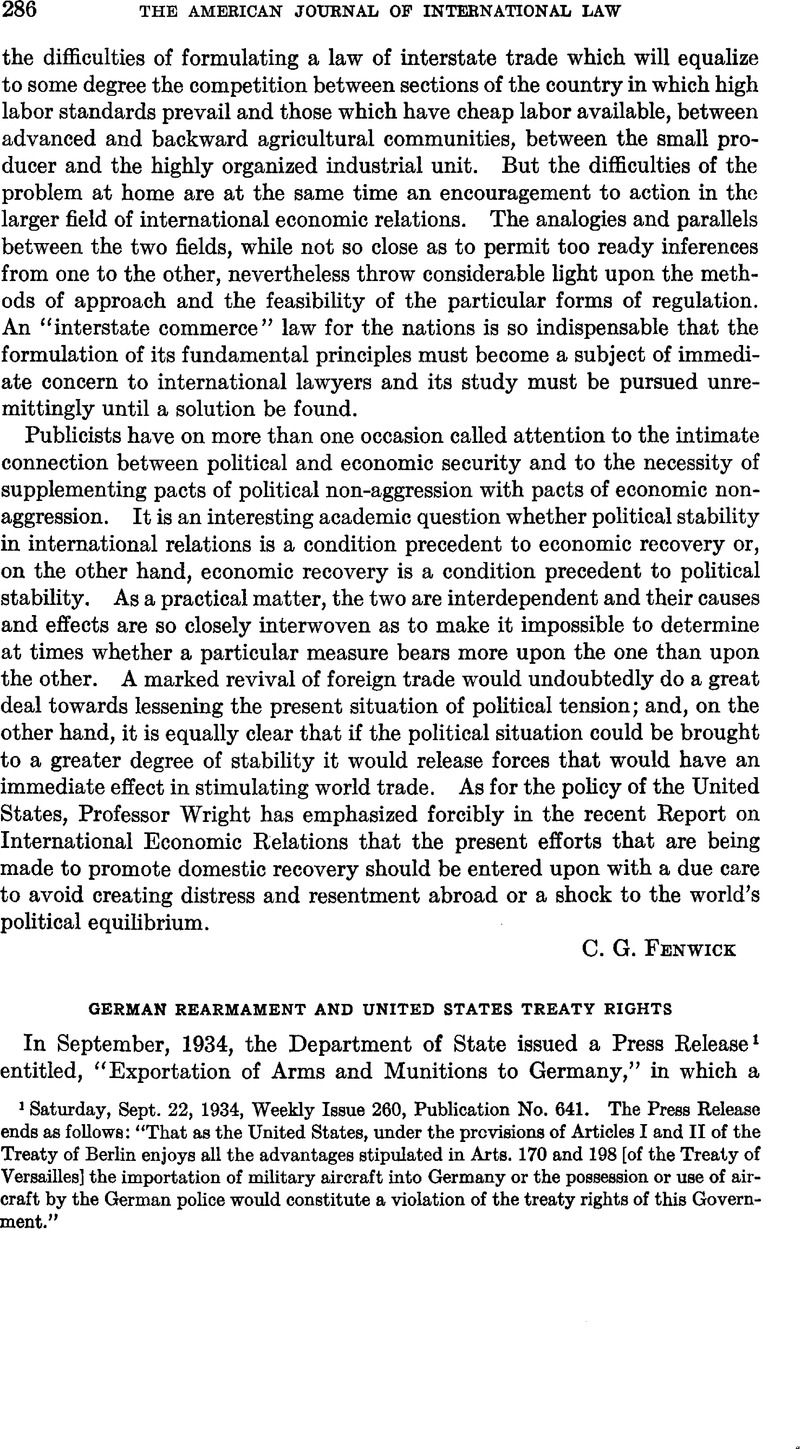No CrossRef data available.
Published online by Cambridge University Press: 12 April 2017

1 Saturday, Sept. 22, 1934, Weekly Issue 260, Publication No. 641. The Press Release ends as follows: “That as the United States, under the previsions of Articles I and II of the Treaty of Berlin enjoys all the advantages stipulated in Arts. 170 and 198 [of the Treaty of Versailles] the importation of military aircraft into Germany or the possession or use of aircraft by the German police would constitute a violation of the treaty rights of this Government.“
2 Art. 170 reads in part: “Importation into Germany of arms, munitions and war materials of every kind shall be strictly prohibited.“
3 See text in 61 Cong. Rec. 5769 (1921); 42 Stat. L. (67th Cong., 1st Sess.), 1939; this journal, Supplement, Vol. 16 (1922), p. 10.
4 See article in New York Times, Sept. 19, 1934, at 8, col. 4, reporting statements of Sir John Simon in the House of Commons; London Times, Sept. 18, 1934, at 12, col. 3; ibid., Sept. 19,1934, at 10, col. 3; Sir John Simon, May 14,1934, in House of Commons, London Times, May 15, 1934, at 8, col. 4; 41 Current History, 200 (Nov. 1934).
5 61 Cong. Rec. 3299; 42 Stat. L. (67th Cong., 1st Sess.), 1921, Public Laws, p. 105.
6 59 Cong. Rec. 5129; ibid., p. 7102; ibid., p. 7429.
7 Art. I.
8 59 Cong. Kee. 6566, May 5, 1920. Italics supplied. The proviso related to the retention of German private property until suitable provision had been made for the satisfaction of all claims of American nationals, etc.
9 Art. II, Sec. 1, reads: “With a view to defining more particularly the obligations of Germany under the foregoing Article with respect to certain provisions in the Treaty of Versailles, it is understood and agreed between the High Contracting Parties: (I) that the rights and advantages stipulated in that Treaty for the benefit of the United States, which it is intended the United States shall have and enjoy, are those defined in Section 1, of Part IV, and Parts V, VI, VIII, IX, X, XI, XII, XIV, and XV.“
10 Treaty of Berlin, Art. II, Sec. 1, par. 2.
11 The debates will be found in 61 Cong. Rec. 173, 183, 8327, 748, 838, 2455, 5776, 6379, 6403, 6059, 5861, 6366, 6248, 6251, 6364, 6382, 5772.
12 2 Sutherland, Statutes and Statutory Construction (2d ed. 1924), Sec. 414; McNair, “Application of the Ejusdem Generis Rule in International Law,” 5 British Year Book of International Law (1924), 181.
13 Qui haeret in litera haeret in cortice. Broom's Legal Maxims, 8th Ed. by J. G. Pease, London, 1911, p. 533, citing Coke's Littleton 283 b. See also St. Paul's proverb, “the letter killeth but the spirit giveth life,” Corinthians, II, ch. 3, verse 6, cited by John Bassett Moore in connection with another question of treaty interpretation, in International Law and Some Current Illusions, New York, 1924, p. 20.